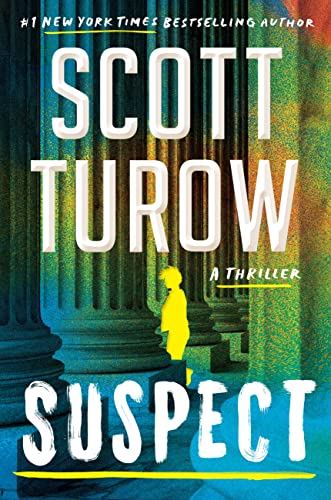Suspect

“Pinky is a bit of a misfit, less like her grandfather but more akin to Stieg Larsson’s Lisbeth Salander in The Girl with the Dragon Tattoo series, though perhaps a bit less psychopathic. They may, however, shop for their facial fashion accessories at the same hardware store.”
Most readers of Scott Turow pick up his books looking for an absorbing legal thriller, and he rarely lets them down. Presumed Innocent launched the Kindle County series and placed Turow on the cutting edge of the legal thriller genre, beating John Grisham to the punch by several years.
Oh, sure, Dickens had taken a stab at it in the mid-19th century with Bleak House. Then, in the latter part of that century, there was The Leavenworth Case, by Ana Katharine Green, although that was more of a detective novel than a pure legal thriller. And, of course, Erle Stanley Gardner’s Perry Mason series was a staple throughout a large part of the 20th century, both in print and on television, and even more recently with a noirish reboot on HBO in 2020.
Still, it was Turow who took the genre to new highs, introducing Rusty Sabich and Alejandro “Sandy” Stern in Presumed Innocent, then a series of other lawyers in the fictional Kindle County. Stern reappeared in other novels as well but, alas, he has now put himself out to pasture, having retired after one final foray into the courtroom in Turow’s The Last Trial, aptly named even if a bit on the nose.
With Suspect, Turow picks up where the retired Stern left off, but not with a lawyer in the Stern bloodline. Instead, he introduces Stern’s granddaughter Clarice “Pinky” Granum, an investigator working with attorney Rik Dudek. Pinky takes the lead in this novel, making it more of a detective story than a legal thriller, like The Leavenworth Case, in which investigator Ebenezer Gryce worked with attorney Everett Raymond.
Pinky is a bit of a misfit, less like her grandfather but more akin to Stieg Larsson’s Lisbeth Salander in The Girl with the Dragon Tattoo series, though perhaps a bit less psychopathic. They may, however, shop for their facial fashion accessories at the same hardware store.
For Pinky, becoming a private investigator was granddad Sandy’s idea, not hers. She tells the reader, “Being a private investigator never occurred to me. It was my grandfather who thought I might have a talent for it. When Pops and my aunt, who were law partners, decided to retire, they offered to pay for a PI training course for me as outplacement. I was like, ‘Why not, okay,’ but I had no clue how much I’d get into it.”
Sorta like musician/writer Kinky Friedman’s unofficial motto when running for governor of Texas in 2006, taken from the title of one of his albums: “Why the hell not?”
In Suspect, Pinky finds herself enmeshed in two mysteries, one professional and one personal. Professionally, she investigates claims of sexual harassment against attorney Dudek’s client, the police chief of Highland Isle. In a twist, the chief is female, Lucia Gomez, and has been accused of requiring sexual favors from cops under her command in exchange for promotions. Or, as Pinky notes, it has been named by grocery store tabloids, “sextortion.”
Chief Gomez’s job is on the line, and she hires Dudek to defend her in a hearing before the Police and Fire Commission, not to mention a federal grand jury investigation that has been instituted by the local United States Attorney. Pinky is tasked with rooting out the truth behind the allegations, complicated by the chief’s admission of sexual encounters with cops. Consensual conduct, the chief insists. “Lying or not, not one of them claims I said or did anything to force them.”
The personal mystery is the new neighbor who has moved in next door to Pinky in her apartment building, the one she has dubbed “TWO,” which stands for “the weird one.” Intrigued by the odd hours he keeps and his aloof, standoffish behavior, she is determined to figure out his story. She wonders whether he is “[a] hit man or a bounty hunter or even someone in law enforcement working undercover?”
This is a mystery Pinky must pursue on her own time, at least at first. Like any good thriller, though, the two stories and their respective characters soon enough merge into one. Then her personal mystery becomes part of the professional one.
The story in Suspect is not as compelling as in other of Turow’s thrillers, nor is Pinky the equal of her grandfather in holding the reader’s interest. Of course, that may simply be this reviewer’s bias as an attorney in favor of pure legal thrillers. Or it may be that Pinky is just a little too weird, trying just a little too much to be different.
Or maybe it’s because she’s still in the early stages of her investigative career. Who knows? Maybe she’ll gain momentum on her next case. And surely there will be a next case. After all, Scott Turow is pretty good at building momentum.